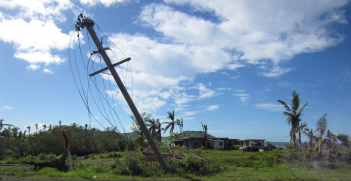How Climate Change Is Affecting The Right To Education

Though education, as a fundamental human right, should be accessible to everyone, schooling remains unattainable for much of the world. Now climate change represents yet another barrier to the right to education.
With the increasing impact of climate change, humanity is witnessing more people being displaced, and infrastructure, including education facilities, destroyed by sudden-onset disasters. It is often confronting to see people deprived of their abodes and having nowhere to go. This leaves them unable to receive an education, further exacerbating the gap between those who are advantaged and disadvantaged. It is therefore important that states seriously consider the impact of climate change on the right to education and adopt policies to address this issue.
Multiple international human rights treaties recognise and define the right to education including the Universal Declaration of Human Rights (UDHR), the International Covenant on Economic, Social, and Cultural Rights (ICESCR), and The Convention on the Rights of the Child (CRC). According to Article 26 of the UDHR, “Everyone has the right to education, that education must be free from elementary and secondary stages, and that elementary education is compulsory.” The right to education requires states to allocate the maximum possible resource to make sure people have access to at least the minimum essentials of education.
Climate change increasingly impacts the right to education. First, those who become displaced due to climate change events or processes often end up being unable to gain access to education. Even where there is access to education, displacement to new areas can lead to language barriers causing frustration and, if unable to be overcome, can lead children to drop out of school. Trauma from displacement itself can also negatively affect a child’s educational performance due to constant instability and a lack of additional time and support focused on these children. The negative effect of climate change on those in developing countries can be seen through its impact on important cognitive skills and progress in school being stunted due to malnutrition.
Second, climate change exerts financial and economic pressure on states which already possess limited resources. This means resources are diverted away from the education sector and states end up being unable to fulfil their obligations to provide access to quality education. This can be seen, for example, in the gender gap in enrolment. Climate change has a disproportionate effect on girls, often causing them to fall further behind in enrolment rates. Studies suggest that by 2025 at least 12.5 million girls could potentially be out of school due to climate change. Girls from developing countries can be forced to walk long distances to find safe drinking water, and in some cases are married off at a young age, stopping them from gaining an education.
Climate change also impacts the right to education directly through extreme weather conditions. Events such as typhoons and hurricanes can destroy school buildings and equipment, which leaves students either temporarily or permanently unable to attend school. Exposure to this kind of extreme weather conditions for children in their early childhood, impacts them at a critical time in their development, causing them even more of an educational disadvantage compared to others who are not exposed to such conditions.
These are all challenges and barriers that climate change poses to the right to education. The absence of a rights-based approach to climate change imposes additional barriers to effective policymaking and action. It is primarily the responsibility of policymakers to understand the genuine threat of climate change on the right to education and to address it.
There are several actions that states need to take to ensure all children can access education despite climate change. The main challenge to this is, of course, climate change itself. States need to stop shirking responsibilities and embrace their commitments to the reduction of greenhouse emissions to prevent global warming.
Recognising the interrelationship between human rights is another key step. The fulfilment of socio-economic and cultural rights had a direct impact on the right to education. For example, governments should endeavour to provide access to clean and safe water near homes so that all children, especially girls who are from developing countries, are not forced to miss schooling due to the need to find available safe water. As water becomes a more precious resource, without direct government intervention by way of water infrastructure, it will become ever harder to receive an education if a child’s chore is to fetch clean water from an unreliable source.
It is also vital that greater resources and funding are allocated towards better understanding the link between climate change and education, including the collection of data and evidence relating to displaced populations due to climate change. Governments and nations must plan ahead for crises which may displace vulnerable persons, so that they are protected through legislation conventions and removing financial barriers that hinder access to education. Affording everyone the right to education, will require cooperation between the regional and international communities. Legal frameworks need to be developed to create legal channels for bilateral and regional agreements so that there can be a reduction of the vulnerabilities that migration places on migrants when trying to obtain an education.
To ensure climate change does not affect people gaining access to education, all states must act towards planning and putting in place actions so that no one suffers from a lack of education. Although these changes will not be easy and will take time and state cooperation, the right to education is necessary in today’s world and all children deserve an education despite the circumstances that surround them.
Olivia Gratton is a student at the University of Newcastle currently studying a Bachelor of Laws and Diploma of Legal Practice. Olivia completed her Bachelor of Communication in 2021 majoring in News and Digital Media.
Fiona Chiu is an international student who is currently studying a graduate degree in Social Change and Development at the University of Newcastle. Fiona completed her Bachelor degree in Social Science in 2020, where she majored in Criminology.
This article is part of a series of submissions from students studying Human Rights and Climate Change-Induced Human Displacement at the University of Newcastle.
This article is published under a Creative Commons Licence and may be republished with attribution.





